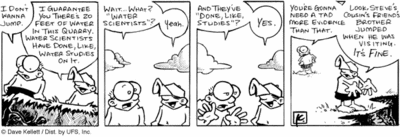Eleven parents of students at a Pennsylvania high school are suing over the school district's decision to include "intelligent design" -- an alternative to evolution that involves a God-like creator -- in the curriculum of ninth-grade biology classes.
The parents and the American Civil Liberties Union (ACLU) say the policy of the Dover Area School District in south-central Pennsylvania violates the constitutional separation of church and state, which forbids teaching religion in public schools.
The school board says there are "gaps" in evolution, which it emphasizes is a theory rather than established fact, and that students have a right to consider other views on the origins of life.
(CNN)
The problem in this story, and much of the "evolution is only a theory" story, is that English and Science are different languages that share a few words, but they mean different things. I figured I'd give a few definitions / explanations here of some words commonly used in the evolution versus ID argument.
Fact/Know/True
English: Something that is absolutely correct, beyond the shadow of a doubt.
Science: These terms are not generally used as their meanings are imprecise. Sometimes when talking w/ laypeople they're used to mean "observation," other times to mean "theory." When talking to other scientists we use different words. Nothing in science can be "known" absolutely as "true," so these words are meaningless.
Observation/Measurement
English: (self-evident)
Science: Data, numbers. This is the only stuff we "know" for "sure" is "true," and even then there can be mistakes in the scientist's methods to get the data. ("Data" is plural, "datum" is singular.) "Observation" is sometimes used to refer to the first step of the Scientific Method, which is also called "Question" at times.
Hypothesis
Science: An untested educated guess about the REASONS or explanation behind what's being experimented upon. May be proven correct or incorrect in the long run. Leads to predictions for specific experiments, and if consistently upheld leads to a theory.
Prediction
Science: A guess about the results of a particular experiment before we've done anything on it. Meaningless in the long term, because (1) it only applies to that specific experiment, and (2) it gets supplanted by data and theories.
Law
Science: A theory that can be expressed in simple terms, such as an easily memorized sentence, or a formula. I've seen many other definitions for the term Law, but this is the one I like. Some such "laws" have since been disproven, or were based upon faulty assumptions, but by tradition they are still called laws.
Theory
English: An untested guess at a reason, with a high chance of being wrong.
Science: A hypothesis that's been tested many many times for many years and hasn't ever been disproven. It's impossible to ever prove anything is absolutely "true" in science, as there is always the possibility of other explanations. A theory is the most likely one, and is as close to being "true" or "right" as scientists will ever admit. (Think of scientists as a non-committal boyfriend who won't say "I do." When he says "if I were going to marry anyone, it'd be you," that's like scientists saying "this is our theory, it hasn't been disproven yet.") Theories are often refined as time progresses, but rarely proven entirely wrong.
For example the geocentric solar system / universe proved wrong and was changed to the heliocentric model. It was refined when we determined the distance to stars, so we knew that the solar system was just part of the universe. Hubble further discovered (1923) that there were other galaxies than our own. Similarly, the reasons behind it all were refined, as Aristotle's "natural motion" turned into Galileo's inertia, Newton's gravity, and then Einstein's General Relativity (~1910). Further tweaks are continuing as Stephen Hawking and others study information in black holes and string theory.
Evolution is a good example of a theory still in the process of being refined at a coarser level. Where we are with evolution would be somewhere between Newton and Einstein with gravity, or between knowing the distance to stars and the distance to galaxies. Natural selection was presented before Darwin (I believe). Darwin extrapolated that, carried to extremes, natural selection could mutate species into other species, and that process was called evolution. During the 20th century it was recognized that there were distinct times when new species "quickly" (hundreds of thousands of years) developed, and this has been incorporated into an updated version of evolution called punctuated equilibrium (not often taught in K-12 schools, sadly). This refinement of the theory of evolution states that environemtnal triggers, such as massive habitat change brought on by a comet or asteroid collision, or ice ages or global warming, would cause "rapid" evolution of new species - faster than can be captured in the fossil record, but still gradual in terms of tens of thousands of generations.
Current-day theory about the geography of the universe is pretty solid. Current theory on gravity/GR (General Relativity) has a major gap, in that we can't yet reconcile GR with quantum mechanics. But we're working on it. Current theory on evolution is pretty solid but has some small gaps, in that we haven't found missing links from the evolutionary explosions, and some subsystems seem difficult to evolve in small steps. But we're working on it.

